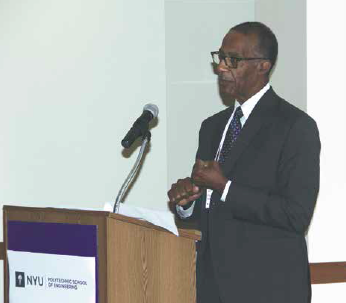On March 12th the NYU Polytechnic School of Engineering held an induction ceremony for the American Association of Blacks in Energy (AABE) Student Chapter. Standout students were honored and various leaders in the field of energy spoke at the ceremony. Among the noted speakers were William Suggs, Wilton Cedeno, and keynote speaker Frank Stewart.
Suggs is the President of AABE’s New York Metropolitan Chapter (NYMC), as well as Senior Specialist in Corporate Environmental Health and Safety at the Consolidated Edison Company of New York (Con Edison). Cedeno is Chairman of the National Board of Directors to AABE, and is Director of Energy Policy and Regulatory Affairs at Con Edison. Frank Stewart is a former AABE President and Chief Operating Officer.
AABE, which was an outgrowth of the 1970s world energy crisis, started in 1977, at a time when minorities were underrepresented in the U.S. energy task force. The AABE mission remains the same as it was from its inception: to serve as a resource for policy discussion on the impact of environmental and energy policies on African Americans and other minorities; to involve the private and public sectors in the problems and goals of people of color in energy-related fields; and to encourage minority students to pursue energy-related careers, by providing scholarships and financial aid.
Stewart addressed the fact that globally disproportionate amounts of people of color still do not have access to electricity (somewhere around 1.5 billion people, or around one quarter of the world’s population, mostly in Africa and Asia). He drew the connection between electric energy and other basic necessities—clean water, healthcare, education, etc. Stewart also addressed the high-level of risks related to climate change that people of color face.
“If you talk to anybody in the lower Ninth Ward in New Orleans, they’re going to have a very personal picture of what climate change is about. And people in New York City, given what happened just over a year ago, need to understand that this is a here and now issue. I tried to point out that there are literally hundreds of thousands of people of color in north and central Africa who are dying every day because they were pushed off their land, which became deserts as a result of climate change. For people of color in the U.S. and around the world, it’s a major issue that’s not being addressed ,” Stewart said to the Harlem Times.
Stewart noted that most people of color in the U.S. live in the Southeast, and in urban and coastal areas — areas that are the most vulnerable to the effects of climate change
“Virtually all of the climate change issues are driven by the use and the misuse of energy,” Stewart said. “It’s up to those who are involved in energy to take the lead in trying to rectify this.”
Stewart referred to natural gas as the “only real option we have,” in addressing current U.S. energy needs, while still reducing the rate of greenhouse gas emissions, and eventually transitioning to renewable energy sources (sunlight, wind, rain, waves, geothermal heat). “The time that renewable energy will produce half of the power in the U.S. will be probably on the order of 2070. So, if we want to do anything between now and then, and we better do something between now and then, then we cannot overlook the essential role that natural gas plays,” Stewart said.
Another major theme brought out at the ceremony is the importance of STEM (science, technology, engineering, and math) education, and the role that it will play in shaping the emerging global economy. This message surely hit home with the students and young people in attendance—including civil engineer and NYU AABE President Ramon Parchment.
“Our whole economy is getting more and more and more STEM dependent. If you’re going to be a success in almost any line of work (healthcare, government, communications, etc.) today is more STEM-dependent than ever before, and if you can’t speak that language, you’ll never be able to move up the corporate ladder, or political ladder, or social ladder to the kind of place where you can really make an impact, unless you understand those issues and can work with those issues,” Stewart said
“When I speak to the young students and people of color in general, I try to let them know the importance of energy and how it impact quality of life across the globe. We have to play a strong role in the energy industry because the energy industry basically keeps the United States and the world moving, no matter what background you come from,” said Suggs. “We should take advantage of whatever STEM programs there are, to play a strong role in the future of the next generation.”
Suggs mentioned the Summer Energy Academy, a program developed by AABE-NYMAC, facilitated and hosted by NYU-Poly, and supported by National Grid and Con Edison. The program was designed to introduce kids (ages 11-14) to pathways to possible energy careers, by studying STEM. The daily curriculum is taught by college students, and includes discussions on energy conservation and green technology. Suggs stressed that it is important for young, soon-to-be leaders to play active roles in helping make their communities more sustainable (economically, socially, and environmentally).
Suggs himself had this to say to young people of color with promising potential in the field of energy: “Never forget who you are and where you come from. Always stand up for what’s right.”

